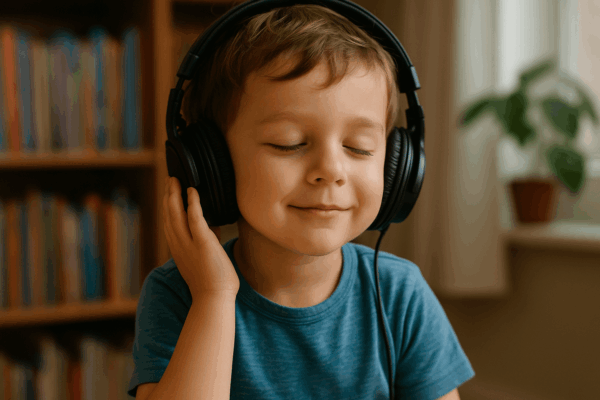How music can help in child development is a topic that draws the attention of parents, educators, and health professionals. The relationship between sound and the cognitive, emotional.
And social development of children has been the subject of numerous studies. In this article, we will explore how music can positively transform childhood by influencing different aspects of a child’s growth.
The Role of Music in Early Childhood
During the early years of life, children’s brains are in constant development. In this context, how music can help in child development becomes evident when we observe how sounds stimulate neural connections.
Simple songs, nursery rhymes, and musical games help develop linguistic, motor, and emotional skills.
Moreover, music acts as a bridge for social interaction. Children who participate in group musical activities learn to share, take turns, and work as a team.
Cognitive Development and Music
Among the main arguments about how music can help in child development, the positive impact on logical and mathematical reasoning stands out. Research shows that children exposed to music find it easier to understand patterns, sequences, and problem-solving.
Studies conducted around the world reveal that musical training can improve academic performance. This is because learning to play an instrument, for instance, requires discipline, concentration, and memory.
Language and Communication
Another essential aspect of how music can help in child development is the encouragement of language acquisition. Melodies facilitate word memorization, encourage correct pronunciation, and expand vocabulary.
Through songs, children begin to understand grammatical structures, rhymes, and sounds. All this contributes to more effective communication, even in children with speech difficulties.
Music and Emotional Development
Understanding the emotional impact of music is also essential. It has the power to calm, uplift, offer comfort, and act as a therapeutic tool during moments of stress or anxiety.
When children learn to identify their emotions through music, they develop emotional intelligence. This allows them to express themselves better and understand others’ feelings with more empathy.
Motor Coordination and Musicality
Musical games, dances, and the use of simple instruments like drums and rattles are essential for developing motor coordination. How music can help in child development is also related to the ability to control body movements.
Musical activities stimulate spatial perception and rhythm, which are crucial for tasks like walking, running, and writing. The integration of sound and movement becomes a complete exercise for both body and mind.
Music and Socialization
Participating in music classes or song circles helps children interact better with peers. How music can help in child development becomes clear when we observe gains in self-esteem, active listening, and respect for diversity.
Music is a universal language that promotes unity and understanding among different cultures. By singing or playing in a group, children learn values like cooperation and solidarity.
Music in the School Environment
Incorporating music into the school routine is one of the most effective ways to demonstrate how music can help in child development. Teachers can use songs to teach content, tell stories, and reinforce concepts.
Schools that include music lessons in their curricula report students who are more motivated, engaged, and with improved performance. Music also makes the environment more welcoming and creative, encouraging the joy of learning.
Music and Children with Special Needs
For children with physical, mental, or sensory disabilities, music can be a powerful ally. Music therapy is a widely used therapeutic resource to develop specific skills.
Reflecting on how music can help in child development, we see that it acts as an alternative channel of communication and expression. It can assist in behavior regulation, focus, and sensory integration.
Suggested Musical Activities at Home
- Listen to music together daily
- Sing lullabies or children’s songs
- Dance freely to different rhythms
- Use improvised instruments (pots, spoons, bottles with grains)
- Create songs about everyday situations
With simple daily practices, parents can observe how music can help in child development in a fun and educational way.
Conclusion
Throughout this article, we’ve seen how music can help in child development in various ways: cognitively, linguistically, emotionally, motorically, and socially. The presence of music from an early age promotes more balanced, creative, and healthy growth.
How music can help in child development is not just a matter of entertainment but of education and holistic development. Whether at home, in school, or in therapy, music proves to be a rich and accessible tool for stimulating children’s potential.
Therefore, including music in daily life is an investment in a more harmonious future. After all, its positive influence on children’s growth is something we should all recognize, appreciate, and incorporate.

